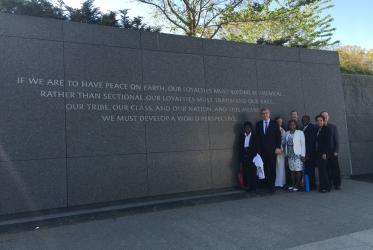Displaying 101 - 120 of 155
28 November 2016
Paralyzed by shock
28 November 2016
Driven out
28 November 2016
WCC fields inter-Orthodox response to convergence text
17 October 2016
WCC appeals for support, for all to stand #WithRefugees
31 August 2016
WCC condemns escalating racial violence in the USA
09 July 2016
New Executive Committee members elected in Trondheim
28 June 2016
USA Racial Justice Accompaniment Visit
18 April 2016
International affairs facilitator reflects on pilgrimage
31 March 2016
"I hit the ground running": Katalina Tahaafe-Williams
16 February 2016
Fleeing from – rather than to – a place
10 February 2016
Symposium focuses on religion, violence, extremism
04 February 2016











